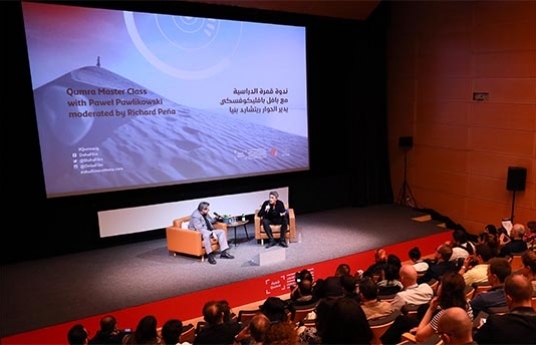Qumra Master Paweł Pawlikowski encourages emerging filmmakers to innovate and break convention
Mar 17, 2019

- The Academy Award® winning Polish director discusses his fluid approach to filmmaking at Qumra’s third masterclass
Doha, Qatar: 17 March 2019: The critically-acclaimed Qumra Master Polish director Paweł Pawlikowski shared his unconventional approach to filmmaking at a masterclass at Qumra 2019. His advice to up-and-coming filmmakers was to go against the grain of typical conventions to make stories and characters come alive.
During the third Qumra Masterclass, Pawlikowski charted his development as a filmmaker three clips of his films: The Last Resort (2000), The Woman in the Fifth (2011), and Ida (2015), which won an Academy Award® for Best Film.
Pawlikowski shared that early in his filmmaking career, as a director of documentaries at the BBC he realised that he wanted to do things differently. He said: “In my view, the job of a filmmaker is to bring your idea to life and that sometimes requires going against the grain. In my early films, I wanted to do something that was a more creative way of looking at the world than simple reportage– to break outside the accepted conventions of documentaries of at the time.”
After moving away from documentaries into narrative feature films, Pawlikowski developed a unique approach to filmmaking that was, “fluid and open”. His experience in documentaries taught him to think on his feet and “see the world through images and sounds”. For this reason, he does not stick rigidly to scripts and allows actors and writers to improvise during filming. He said: “A script is never fixed – it is a fluid thing. The best things come up in dialogue and that is why I often make changes to scripts with my co-writers during filming and allow actors to improvise and contribute their ideas as well.” On casting and location, Pawlikowski said that his approach was to instinctively look and react.
As well as giving up-and-coming filmmakers an insight into his creative process, Pawlikowski also talked about common themes in his films such as the relationship between mothers and sons, romantic love, and immigration. On storytelling in cinema, he said: “You really don’t need to spell the whole thing out. Trust your audience to imagine the rest. Always make sure that your characters are at the heart of the story and not political or social contexts. With a good character and a good actor that can bring them to life, the work of a director is largely done.”
Pawlikowski’s final words of wisdom were on decision making and self-editing. He said: “As I have become more experienced as a filmmaker, I have learned that decisions on what not to include are as important on what to include. You don’t need to overtell your story. My advice to up-and-coming filmmakers is to discover who you are, what your tastes are, and what you like. You need to do this to be secure and confident enough to make difficult creative decisions.”
The fifth edition of Qumra brings together more than 150 acclaimed filmmakers, industry professionals and experts to nurture 36 Qumra Projects – by first and second-time filmmakers that are in various stages of development. The six-day event takes place 15–20 March at Souq Waqif and the Museum of Islamic Art, and features Qumra Master Classes, Qumra Talks and Qumra Masters and New Voices in Cinema screening.
Further details about ticket prices and sales for the screenings are now available on www.dohafilminstitute.com.